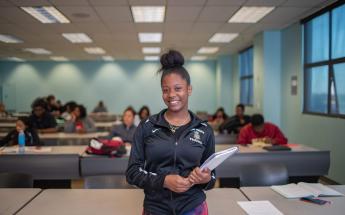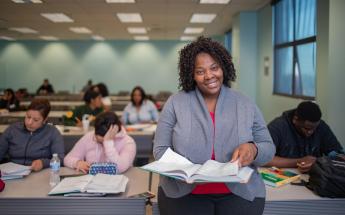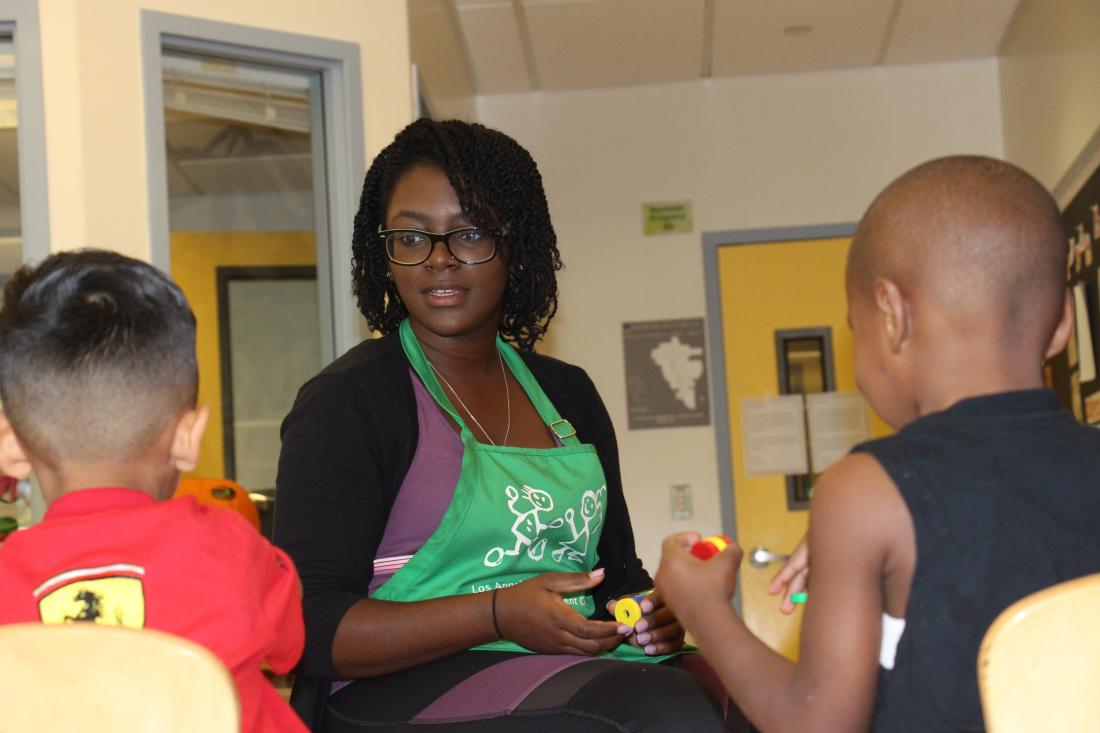Child Development (AA)
Careers in Child Development
Most people with degrees in child development work in education, but the possibilities are vast when it comes to how you can apply your education. While many work in child development centers or classrooms, those with backgrounds in child development are found in a wide-range of environments: travel the world as a nanny, collaborate with child psychologists to create the newest toys, work with families and children in an office as a therapist. The possibilities are practically endless with a degree in Child Development!
Here are some careers you can have with a Child Development degree:
Career information below is taken from bls.gov November 2019. Go to bls.gov for most current career information.
Educate and care for children younger than age 5 who have not yet entered kindergarten.
Data for Los Angeles/Long Beach/Anaheim
| Typical Education Level: | Salary: | Hourly Median Wage: |
|---|---|---|
| Associate Degree | $38,190/year | $18.36/hour |
| Work Experience in a Related Occupation: | Job Outlook 2018-2028: | Number of Jobs 2018: |
| None needed | 7% increase (as fast as average) | 17,040 |
Instruct young students in basic subjects in order to prepare them for future schooling.
Data for Los Angeles/Long Beach/Anaheim
| Typical Education Level: | Salary: | Hourly Median Wage: |
|---|---|---|
| Bachelor’s Degree | $70,310/year | $33.80/hour |
| Work Experience in a Related Occupation: | Job Outlook 2018-2028: | Number of Jobs 2018: |
| None needed | 2% increase (slower than average) | 3,540 |
Study cognitive, emotional, and social processes and behavior by observing, interpreting, and recording how individuals relate to one another and to their environments.
National data
| Typical Education Level: | Salary: | Hourly Median Wage: |
|---|---|---|
| Doctoral Degree | $79,010/year | $37.99/hour |
| Work Experience in a Related Occupation: | Job Outlook 2018-2028: | Number of Jobs 2018: |
| None needed | 14% increase (faster than average) | 181,700 |
Oversee all school operations, including daily school activities.
Data for state of California
| Typical Education Level: | Salary: | Hourly Median Wage: |
|---|---|---|
| Master's Degree | $124,500/year | $59.86/hour |
| Work Experience in a Related Occupation: | Job Outlook 2018-2028: | Number of Jobs 2018: |
| 5 or more years needed | 4% increase (as fast as average) | 22,950 |
Help students develop the academic and social skills needed to succeed.
National data
| Typical Education Level: | Salary: | Hourly Median Wage: |
|---|---|---|
| Master's Degree | $56,310/year | $27.07/hour |
| Work Experience in a Related Occupation: | Job Outlook 2018-2028: | Number of Jobs 2018: |
| None needed | 8% increase (faster than average) | 324,500 |
Supervise and lead staff, design program plans, oversee daily activities, and prepare budgets.
Data for Los Angeles/Long Beach/Anaheim
| Typical Education Level: | Salary: | Hourly Median Wage: |
|---|---|---|
| Bachelor’s Degree | $53,990/year | $25.96/hour |
| Work Experience in a Related Occupation: | Job Outlook 2018-2028: | Number of Jobs 2018: |
| Less than 5 years needed | 7% increase (faster than average) | 2,350 |
What You’ll Learn at LASC in Child Development
You can get an Associate in Arts (AA) degree through LASC’s Child Development program where you will gain detailed insight into the development and learning of children from birth to age 8, become knowledgeable about developmentally appropriate curriculum for differently-abled children, and prepare for a future career in teaching and childcare:
- Review our Child Development Brochure program to discover the skills, academic foundation, and hands-on training to help you develop the skills you need to succeed in careers in child development.
- Working with children requires being able to react quickly and appropriately for any given situation. You’ll expand your critical-thinking skills for working with and teaching young children so you will have the foundation to manage different children’s needs and developmental stages in various situations.
- Gain an insider’s view of a child development center by putting your classroom knowledge into action at LASC’s Child Development Center.
- Create developmentally appropriate success strategies for young children to help them move from one stage of development to the next.
- Learn how to check your own biases when it comes to education and educating children.
- Want to transfer? Talk with your academic counselor about how you can transfer with an LASC associate degree in Child Development to a four-year college or university to get a bachelor's degree. And, check out our Associate in Science for Transfer (AST) degree in Early Childhood Education where you can graduate with guaranteed admission into a CSU, and even some UCs! See your counselor for more information.
Requirements to Become an Early Educator:
Once you successfully complete your Associate in Arts in Child Development at LASC, you will be ready to take the Child Care Licensing Exam, as well as meet the minimum requirements to work within the Los Angeles area and the state of California.
Please review the requirements below to find out what you’ll need to work in child development in L.A. and California:
Review the Child Care Licensing Requirements needed in California
Review the requirements needed to work in the Los Angeles Unified School District
Child Development Training Consortium Permit Matrix
California Department of Education Immunization Requirements
State of California Health & Human Services Agency – Request for Live Scan
Degrees & Courses You Will Take
Review the LASC Associate in Arts in Child Development (AA) and Associate in Arts in Liberal Arts: Child Development (AA) degrees below along with our suggested course of study for these programs. Go to LASC’s current Course Catalog for specific course information:
Major Code: 1305.00
Total Units Required: 60
The mission of the Child Development program is to provide an environment for quality learning for a diverse population of students in the discipline of Child Development. Our courses, programs, and activities are designed to educate, inform, and model “Best Practices” for educating and nurturing young children, working with families, and providing services to the community in a variety of early childhood educational careers.
The program is designed to meet your educational and vocational training needs to either prepare you for employment or broaden your knowledge if you are already employed in public (Title 5) or private (Title 22) preschools.
The Child Development Department and Child Development Center laboratory school collectively provide the education and vocational training necessary for LASC Child Development students to succeed in their higher educational/transfer goals, individual career choices, and professional business plans.
Upon completion of this program, you should be able to:
- Integrate understanding of the needs, the characteristics and multiple influences on the development of children from birth to age eight as it relates to optimum growth and development.
- Create developmentally appropriate strategies, techniques, and curriculum incorporating domains of learning, health, safety, nutrition, as well as anti-bias and adaptation principles for working with typical and atypical developing children.
- Apply developmentally appropriate social emotional learning strategies and positive guidance techniques in a professional early childhood setting.
- Evaluate and utilize various observation and assessment methods for measuring and recording children’s develop mental progress.
- Implement various early childhood environmental rating scales and assessment tools.
- Compare and contrast the basic theories in child development, family studies, as well as historical perspectives of ECE programs.
- Uphold professional standards (based on NAEYC Code of Ethics) for job seeking, respecting, interacting, and communicating with others (parents, staff, children, community members, colleagues and peers).
- Demonstrate strategies and techniques for building sensitive and respectful family and community relationships.
- Develop critical-thinking and problem-solving skills for learning and promoting learning in young children.
| Required Courses: | Units |
|---|---|
| CH DEV 1 Child Growth and Development | 3 |
| CH DEV 2 Early Childhood: Principles and Practices | 3 |
| CH DEV 7 Introduction to Early Childhood Curriculum | 3 |
| CH DEV 8 Curriculum in Early Childhood Education | 3 |
| CH DEV 10 Health, Safety and Nutrition | 3 |
| CH DEV Child, Family and Community | 3 |
| CH DEV 22 Practicum in Child Development I | 4 |
| CH DEV 23 Practicum in Child Development II | 4 |
| CH DEV 34 Observing and Recording Children’s Behavior | 3 |
| CH DEV 42 Teaching in a Diverse Society | 3 |
| TOTAL UNITS | 32 |
Specialized Electives
| Infant and Toddler Studies | |
|---|---|
| CH DEV 30 Infant and Toddler Studies I | 3 |
| CH DEV 31 Infant and Toddler Studies II | 3 |
| Language and Literacy | |
| CH DEV 35 Fostering Literacy Development In Young Children | 3 |
| CH DEV 36 Literature for Early Childhood | 1 |
| CH DEV 37 Literature for School Age Children | 2 |
| Administrative and Supervision of Early Childhood Programs | |
| CH DEV 38 Administration & Supervision of Early Childhood Programs I | 3 |
| CH DEV 39 Administration & Supervision of Early Childhood Programs II | 3 |
| CH DEV 65 Adult Supervision/Early Childhood Mentoring | 2 |
| Children with Special Needs | |
| CH DEV 44 Early Intervention for Children with Special Needs I | 3 |
| CH DEV 45 Programs for Children with Special Needs I | 3 |
| School-Age Children and Programs | |
| CH DEV 46 School Age Programs I | 3 |
| CH DEV 47 School Age Programs II | 3 |
| Positive Guidance and Family School Relationships | |
| CH DEV 48 Positive Guidance in Early Childhood Settings | 3 |
| CH DEV 12 Parent-Teacher-Child Interaction | 3 |
| Additional Electives | |
| CH DEV 9 Advanced Curriculum: Art in Early Childhood | 3 |
| CH DEV 27 Advanced Curriculum: Science and Math in Early Childhood | 3 |
| CH DEV 28 Advanced Curriculum: Music, Movement and Language Arts Curriculum | 3 |
| FAM & CS 21 Nutrition | 3 |
| TOTAL UNITS | 18 |
Major Code: 4901.02
Total Units Required: 60
Upon completion of this program, you should be able to:
- Integrate understanding of the needs, the characteristics and multiple influences on the development of children from birth to age eight as it relates to optimum growth and development.
- Create developmentally appropriate strategies, techniques, and curriculum incorporating domains of learning, health, safety, nutrition, as well as anti-bias and adaptation principles for working with typical and atypical developing children.
- Evaluate and utilize various observation and assessment methods for measuring and recording children’s developmental progress.
- Compare and contrast the basic theories in child development, family studies, as well as historical perspectives of ECE programs.
- Demonstrate strategies and techniques for building sensitive and respectful family and community relationships.
- Develop critical-thinking and problem-solving skills for learning and promoting learning in young children.
| Required Courses: | Units |
|---|---|
| CH DEV 1 Child Growth and Development | 3 |
| CH DEV 2 Early Childhood: Principles and Practices | 3 |
| CH DEV 7 Introduction to Early Childhood Curriculum | 3 |
| CH DEV 10 Health, Safety, and Nutrition | 3 |
| CH DEV 11 Child, Family and Community | 3 |
| CH DEV 42 Teaching in a Diverse Society | 3 |
| TOTAL UNITS | 18 |
Get Ready Before You Start
Interested in a career in child development? Before your first class starts at LASC, you can start preparing for your early childhood education career:
- Make an appointment with your LASC academic counselor to review LASC’s program, develop a Student Education Plan (SEP), and discuss your career goals to see if transferring to a four-year college or university may be beneficial for what you want to do in the future.
- Still in high school? Contact local childcare and daycare centers, elementary schools, and preschools to see if you could observe for an afternoon to watch child development educators in action. Contact local social welfare offices to see if they have any summer internships or volunteer experiences. Talk with your high school counselor to see if they can recommend any local opportunities that you could be a part of.
- Once you’re at LASC, make sure to get involved with on-campus clubs and organizations, such as the Urban Teacher Fellowship, Making a Difference in Education (MADE), and Toastmasters, or become a student ambassador, or run for student body government. These create new relationships and show potential employers your commitment to learning, building your critical-thinking and leadership skills, and getting to know your community.
Grants
Make the most with your time at LASC, and gain career experience while meeting and working with others who want to further their knowledge and experience for a thriving career in child development:
Child Development Teacher Grant – get money to help pay for your child development education so you can enter the field of childcare and development in a licensed children’s center.
Program Learning Outcomes

As a student, once you complete the program you should be able to:
- Integrate understanding of characteristics, special needs, and multiple influences on the development of children from birth to age eight as it relates to early childhood theories and milestones for optimal growth and development.
- Create and implement developmentally appropriate strategies, best practices, techniques, and curriculum incorporating the California Early Childhood Educator Competencies, as well as anti-bias and adaptation principles for working with typical and atypical developing children.

- Identify and evaluate developmental, environmental and teacher-child interaction assessment tools.
- Integrate understanding of infant and early childhood social emotional development, mental health, adverse childhood experiences, brain growth and development and the importance of attachment and relationships on the lives of children.

- Identify and demonstrate the strategies and techniques for building sensitive and respectful child, family, and community relationships that express understanding of culture, diversity, and factors that influence health safety, nutrition, and mental health.
- Uphold professional standards (based on NAEYC code of Ethics) for job seeking, respecting, interacting, and communicating with others (parents, staff, children, community members, colleagues, and peers).
